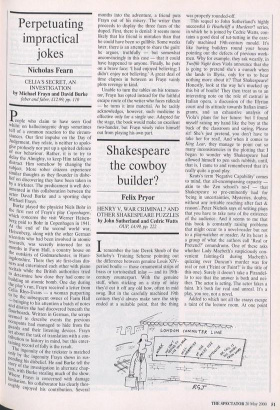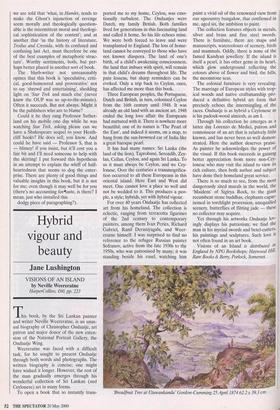Shakespeare the cowboy builder?
Felix Pryor
HENRY V, WAR CRIMINAL? AND OTHER SHAKESPEARE PUZZLES by John Sutherland and Cedric Watts
OUP, £4.99, pp. 222
Iremember the late Derek Shrub of the Sotheby's Training Scheme pointing out the difference between genuine Louis XIV- period boulle — those ornamental strips of brass or tortoiseshell inlay — and its 19th- century counterpart. With the genuine stuff, when sticking on a strip of inlay they'd cut it off any old how, often in mid swag. But in the carefully machined 19th century they'd always make sure the strip ended at a suitable point, that the thing
was properly rounded-off.
This sequel to John Sutherland's highly successful Is Heathcliff a Murderer? series, in which he is joined by Cedric Watts, con- tains a good deal of tut-tutting in the care- fully machined 19th-century mould. It's like having builders round your house pointing out the defects of previous work- men. Why for example, they ask wearily, in Twelfth Night does Viola announce that she is going to pretend she's a eunuch when she lands in Illyria, only for us to hear nothing more about it? That Shakespeare! Honestly, look at the way he's mucked up this bit of boulle! They then treat us to an interesting note on the role of castrati in Italian opera, a discussion of the Illyrian court and its attitude towards Italian immi- grants, and an exhaustive analysis of Viola's plans for her future: but I found myself raising my hand like the boy at the back of the classroom and saying, Please sir! She's just pretend, you don't have to take her for real!, And when it comes to King Lear, they manage to point out so many inconsistencies in the plotting that I began to wonder why Shakespeare had allowed himself to pen such rubbish, until, that is, I came to and remembered that it's really quite a good play.
Keats's term 'Negative Capability' comes to mind, that all-encompassing capacity akin to the Zen school's no-I — that Shakespeare so pre-eminently had for `being in uncertainties, Mysteries, doubts, without any irritable reaching after fact & reason'. Peter Nichols says of writing plays that you have to take note of the existence of the audience. And it seems to me that this book is constantly raising problems that might occur to a novel-reader but not to a play-watcher or reader. At its heart is a group of what the authors call 'Real or Pretend?' conundrums. One of these asks whether Lady Macbeth's suspiciously con- venient fainting-fit during Macbeth's quizzing over Duncan's murder was for real or not (`Feint or Faint?' is the title of this one). Surely it doesn't take a Pirandel- lo to see that the answer is both and nei- ther. The actor is acting. The actor fakes a faint. It's both for real and unreal. It's a play, you see, not a novel.
Added to which not all the essays escape a taint of the lecture room. At one point we are told that 'what, in Hamlet, tends to make the Ghost's injunction of revenge seem morally and theologically question- able is the intermittent moral and theologi- cal sophistication of the context'; and at another that 'in the history of literature, Troilus and Cressida, with its confused and confusing last Act, must therefore be one of the best examples of metaphoric struc- ture'. Worthy sentiments, both, but per- haps better placed in another sort of book.
The blurb-writer not unreasonably opines that this book is 'speculative, criti- cal, good-humoured and provocative' not to say 'shrewd and entertaining', shedding light on 'Star Trek and much else' (never knew the OUP was so up-to-the-minute). Often it succeeds. But not always. Might it be the publishers who are to blame?
Could it be they rang Professor Suther- land on his mobile one day while he was watching Star Trek, asking please can we have a Shakespeare sequel to your Heath- cliff books? He does sell, you know. And could he have said — Professor S, that is — blimey! if you insist, but it'll cost you a fair bit and I'll need someone to help with the skirting! I put forward this hypothesis in an attempt to explain the whiff of half- heartedness, that seems to dog the enter- prise. There are plenty of good things and valuable insights in this book, but it is not for me; even though it may well be for you (there's no accounting for taste, is there? I mean, just who installed this dodgy piece of paragraphing?).










































































 Previous page
Previous page